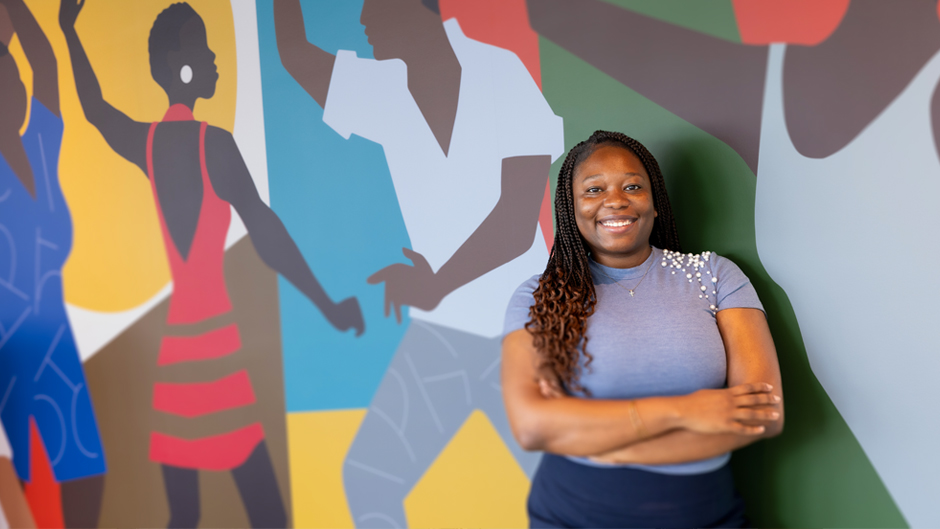At the start of the spring semester, Guerdiana Thelomar set her sights on the boundless opportunities that were ahead of her.
Determined to make a difference in the lives of women of color navigating the challenges of higher education in predominately white institutions, the Miami native entered the third year of her doctoral program with a laundry list of accomplishments—and ready to add to it.
“My field of research allows me to take theories and frameworks from different areas and incorporate the work of Black feminists into my work,” said Thelomar. “I find this work to be really intriguing, and I love what I’m studying.”
Thelomar, a Ph.D candidate from the School of Education and Human Development, is actively seeking solutions to these social issues through a community-based approach. She is deeply committed to social justice and developing environments that empower individuals with the resources to drive change in their lives and communities.
Currently in her third year of the Community Well-Being Program, her research delves into the psychological distress and protective factors experienced by Black students at predominantly white institutions of higher education before and after the COVID-19 pandemic.
Recently, Thelomar received the 2024 K. Patricia Cross Future Leaders Award for her contributions to the campus and wider Miami community. Among nearly 100 exceptional graduate student nominees globally, her commitment to academic innovation in equity and community engagement distinguished her for this accolade. She was nominated for the award by Laura Kohn-Wood, dean of the School of Education and Human Development. Kohn-Wood is also her mentor and advisor.
Thelomar wears many different hats on the Coral Gables Campus, each aligned with her overarching goal. She serves as the president of the Black Graduate Student Association and the graduate assistant for the Office of Multicultural Student Affairs (MSA).
On Feb. 14, she will be a panelist at “Centering Self-Love: Woman of Color in Academic Luncheon and Panel,” an event she helped plan. Hosted by the MSA program Enough, a mentorship program for women of color, the event aims to encourage others to reflect, process, and share their experiences about what it means to navigate higher education as members of the University.
“The reason behind wanting to have this particular event on Valentine’s Day was to create a space where we could process together—because it is a unique challenge,” said Thelomar. “We also wanted to create a space for people to come up with ways that we can heal from these things, so we can keep moving forward.”
Kennedy Robinson-Birt, director of MSA, hopes the event will provide support for women of color who may sometimes feel overlooked to know they are not alone.
“Enough was started for reasons that mirror what we are currently seeing taking place in higher education institutions—to support and uplift women of color,” said Robinson-Birt, who will moderate the panel. “Women of color are known to excel and achieve, yet that is often met with invisible burdens we often carry within the spaces we occupy and those who are closest to us.”
Thelomar is excited to see the hard work of MSA’s planning come together. She worked closely with one of the original five founders of Enough, Sierra Straker, to plan the event.
“Community support means the world to me,” said Straker, a junior studying psychology. “Navigating the intersection of being a woman and a person of color is hard already. Enough aims to cultivate a space to turn to and where you can be seen, heard, and understood.”
Other panelists include Ellenmarie McPhillip, associate dean of programs in the School of Education and Human Development; Shirelle Jackson, executive associate athletic director of student-athlete development; Stephanie Nuñez, residential life coordinator of Eaton Residential College; and Zuri Greenlee, student chair of the Multicultural Student Council.
According to Thelomar’s research, there is a national rise in students experiencing stress or anxiety. Through her personal experiences and empathy toward other women of color, she is devoted to helping others navigate through their challenges and strives to continuously work toward better mental health resources for those in need.
“I hope my work positively contributes to the movement of reducing that number and that we don’t just talk about it, but take action,” Thelomar said. “It's very personal to me.”

